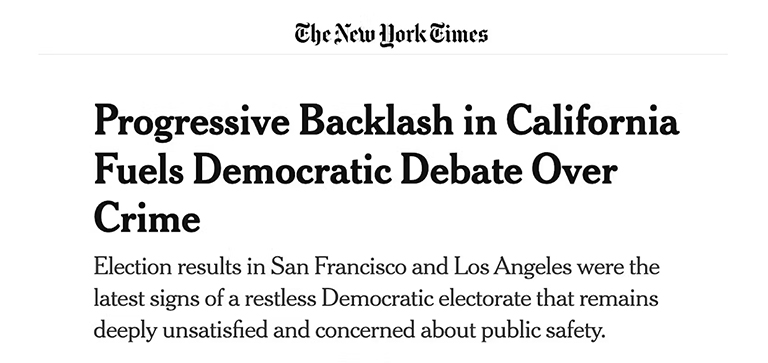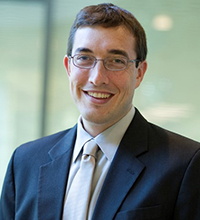Following George Floyd’s death at the hands of police in Minneapolis in 2020, the US has undergone a national reckoning over crime prevention and police reform.
Journalists and politicians on both sides of the aisle have claimed that local election results over the past four years in places like San Francisco and Los Angeles reflect a widespread frustration with Democratic policies on crime in cities.
Across the country, calls went out from activists to rethink the scope and role of the police. Some on the left vowed to ‘defund’ the police. Others on the right promised to instead ‘back the blue’ and maintain or increase police funding.
This rhetorical tug-of-war unfolded while many cities across the country grappled with spiking crime rates during the first months of the COVID-19 pandemic.
Blaming crime on Democratic city leaders was a centerpiece of Donald Trump’s 2024 presidential campaign. He repeatedly made claims about crime spikes in recent years without evidence or context.
More recently, Republican congressional leaders have called several Democratic mayors from across the country to testify before Congress about their sanctuary city policies that are aimed at protecting noncitizens from deportation.
These congressional politicians have asserted that these Democratic mayors – Brandon Johnson of Chicago, Mike Johnston of Denver, Michelle Wu of Boston, and Eric Adams of New York – have “created a public safety nightmare” in their cities by allowing immigrants without legal authorization to stay there.
Journalists and politicians on both sides of the aisle have claimed that local election results over the past four years in places like San Francisco and Los Angeles reflect a widespread frustration with Democratic policies on crime in cities.
Under this argument, Democratic city leaders need to change their approach on crime to satisfy voters. It’s become a political axiom of sorts that policies championed largely by Democratic city leaders over the past half decade have resulted in rising crime levels.
As researchers of politics and public policy, we wanted to figure out if that was true.

A New York Times headline from June 8, 2022, linking crime rates and the Democratic Party (©The New York Times).
Neither party does a better job
As any student of introductory statistics learns, correlation doesn’t imply causation. Looking at increases or decreases in crime rates in Republican or Democratic cities and claiming either party is to blame would be making exactly this error: confusing correlation with causation.
When we examined the number of sworn police officers in cities and how much money those cities spend on the police, Democratic and Republican mayors alike have had surprisingly little influence on police department budgets or sizes.
We put to the test the argument that one side or the other is better at fighting crime in our research published in January 2025. By employing three decades of data on mayoral elections from across the country, we were able to disentangle city leaders’ partisanship from other features of cities.
Contrary to much of the political rhetoric and media coverage aimed at most Americans, our results show that neither party is doing a better job at actually causing crime to decrease.
In Dallas, Mayor Eric Johnson has claimed that Democratic leaders aren’t taking public safety seriously and that the Democratic Party is “with the criminals.” Johnson switched from being a Democrat to a Republican in 2023 and attributes his decision at least partially to this partisan difference on crime and policing and the seriousness with which he takes this policy issue.
But our research shows that Johnson’s and others’ claims about Democratic cities becoming more dangerous just aren’t true: Mayors from the Democratic Party aren’t making cities any more – or less – dangerous than mayors from the Republican Party.
Nor, it turns out, is there any support for claims by some progressive Democrats that they would reduce the role – and enormous budgets – of police departments in cities across the country.
When we examined the number of sworn police officers in cities and how much money those cities spend on the police, Democratic and Republican mayors alike have had surprisingly little influence on police department budgets or sizes.
In other words, Democrats aren’t cutting police budgets, nor are Republicans increasing police budgets. Most cities have increased police budgets in the past few years, possibly due to pressure from police unions.
‘Crime is non-partisan’
It turns out that campaign promises from both sides of the partisan aisle about crime and policing have little bearing on what’s happening on the ground in most cities and police departments across the country.
Neither party is doing a better job at reducing crime, nor actually addressing the ballooning financial cost of local police forces in the US, nor the long-term reputational costs from police misconduct for trust in the police and government more broadly.
Neither party is doing a better job at reducing crime. Nor is either party actually addressing the ballooning financial cost of local police forces in the US, nor the long-term reputational costs from police misconduct for trust in the police and government more broadly. As others have said: crime is non-partisan.
Crime has decreased across the US during the past three decades overall, and the isolated cities where crime has increased recently can reverse these temporary trends. Partisan blame narratives do little to actually lower crime and make neighborhoods safer, though.
There are real evidence-backed policies that reduce crime – such as youth jobs programs in Chicago and Boston. Other policies reduce racial disparities in the criminal justice system – such as alternative 911 response programs that use unarmed behavioral health workers to respond to some types of emergencies.
These policies and interventions might not be as slogan-worthy as “defund the police” or “back the blue.” Nor is implementing these policies as politically convenient as blaming sanctuary city mayors. But research shows that they work and can move cities toward the shared goal of improved public safety for their residents.
This article first appeared on The Conversation, and is republished under a Creative Commons licence; you can read the original here.
About the Authors
 Justin de Benedictis-Kessner is an Associate Professor of Public Policy at the Kennedy School of Government at Harvard University, whose research focuses on important policy areas that concern local governments, such as housing, transportation, policing, and economic development. His research also examines how citizens hold elected officials accountable, how representation translates the public’s interests into policy, and how people’s policy opinions are formed and swayed. Prof de Benedictis-Kessner teaches in Harvard’s MPP program on politics and ethics, and leads elective courses on urban politics and policy, including an experiential field lab partnering student with cities and towns to work on applied urban policy problems.
Justin de Benedictis-Kessner is an Associate Professor of Public Policy at the Kennedy School of Government at Harvard University, whose research focuses on important policy areas that concern local governments, such as housing, transportation, policing, and economic development. His research also examines how citizens hold elected officials accountable, how representation translates the public’s interests into policy, and how people’s policy opinions are formed and swayed. Prof de Benedictis-Kessner teaches in Harvard’s MPP program on politics and ethics, and leads elective courses on urban politics and policy, including an experiential field lab partnering student with cities and towns to work on applied urban policy problems.
 Christopher Warshaw is a Professor of Political Science at George Washington University, whose areas of research include American politics, representation, public opinion, state and local politics, environmental politics and policy, and statistical methodology. In addition to his research on representation and elections, he has written on a wide range of topics in political science including survey design, energy policy, judicial politics, and the institutional underpinnings of democratization. Prof Warshaw has a PhD in Political Science from Stanford University, and previously taught at the Massachusetts Institute of Technology.
Christopher Warshaw is a Professor of Political Science at George Washington University, whose areas of research include American politics, representation, public opinion, state and local politics, environmental politics and policy, and statistical methodology. In addition to his research on representation and elections, he has written on a wide range of topics in political science including survey design, energy policy, judicial politics, and the institutional underpinnings of democratization. Prof Warshaw has a PhD in Political Science from Stanford University, and previously taught at the Massachusetts Institute of Technology.
Picture © Gorodenkof / Shutterstock


